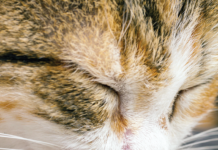As you may have guessed, cats – with their streak of independence – dont always make very good patients. If you currently take care of your ailing cat at home, you probably know this firsthand. But there are nevertheless times when homecare is advisable for speeding up your cats recovery from an illness or injury. Nursing a kitty at home can be a real challenge, but with the right training, equipment and monitoring, you and your cat will both do fine.

252
Deciding to Treat Your Cat at Home
Cats are masters at hiding signs of illness, says Stephen Dullard, DVM of Ancare Veterinary Clinic in Mendota, Illinois. Therefore, it would be a mistake to treat your cat before you see a veterinarian to get a proper diagnosis. Then if your veterinarian suggests further recovery at home, you can feel more secure about your decision.
There are a few reasons why pets may be better off at home with conditions that do not require continuous care from a veterinarian. Your cat will usually be more comfortable in familiar surroundings with the companions he knows and trusts. Homecare also decreases the chance of your cat picking up a hospital-based infection.
But before leaving the veterinarians office, get the proper training to treat your cat, says Dr. Dullard, who is the president of the American Association of Feline Practitioners. Make sure you get all your questions answered. This may include how to give your cat medicine, take his temperature, administer subcutaneous fluids (as is necessary in treating kidney disease) or change bandages.
Do only what you feel comfortable doing with your cat, says Dr. Dullard. If you think you cant handle the situation at home, discuss it with your veterinarian and see what other options there are.
Cats do become nervous when held in certain ways, especially when we try to give them medicine or take their temperature (see related article in CatWatch, December 2005). To protect yourself from scratches and bites (which can be serious to humans), you need to learn how to handle your cat while taking care of her. If necessary, you may need to restrain the cat by wrapping her in a towel. Whenever possible, enlist the help of an assistant when you must do something the cat will find unpleasant – or if your cat seems very excitable.
Making Up the Sick Room
Find a room or spot for an ailing cat that is away from a lot of traffic in your home. It should be quiet, says Dr. Dullard, but its not necessary to isolate your cat altogether. Your cat will actually be much happier seeing familiar human companions. Keep a watch on your children, if possible. Tell the ones who understand that the kitty is ill and needs some time alone to get better.
If you have multiple cats, keep them away until your cat has recovered sufficiently, says Dr. Dullard, especially if one cat tends to dominate the food and water resources. This will also allow you to properly monitor your cats food and water consumption – and the litter box for urination and bowel movements. Otherwise, he says, you wont be able to tell if your sick kitty is eating, drinking or relieving himself properly.
The best spot for your cat should be in a room that is well ventilated, but not too cold and not too hot. Try for a room temperature of 70 to 72 degrees F.
Make your cat comfortable in a box with a blanket; even better, place incontinence padding underneath. The blanket should be washable. So should other items in the room, such as carpets or rugs. To be extra safe, remove these items and replace them with layers of newspapers. Keep a clean litter tray near your cat, but away from eating and drinking dishes.
The right equipment can make all the difference in how easy or difficult treatment will be. Provide yourself with a small table or bench conveniently near the cat. Store all the medicines, instruments, food and water dishes in this work area. Wash any instruments (i.e., thermometer) after each use and also wash your hands before and after handling your cat. If you have small children around, keep any risky equipment locked in a cabinet.
Keep in Touch with Your Cats Veterinarian
Its very important to keep your veterinarian apprised of your cats progress. In order to do this, use a simple notebook or chart to record daily information your veterinarian needs to know about your cats particular condition. This may include your cats temperature, dosage of medicines, amount of eating and drinking and any behavioral changes.
Establish check-up times with your veterinarian to let him or her know how your cat is doing. Even if your cat is recovering well, its important to bring your cat in for follow-up examinations and care, says Dr. Dullard.
In most cases, your cat will do well recovering under your attention. But dont expect your cat to thank you for taking care of him at home. Your thanks will come from seeing your cat eat, run and play again – and knowing that you had a major part in his recovery.



